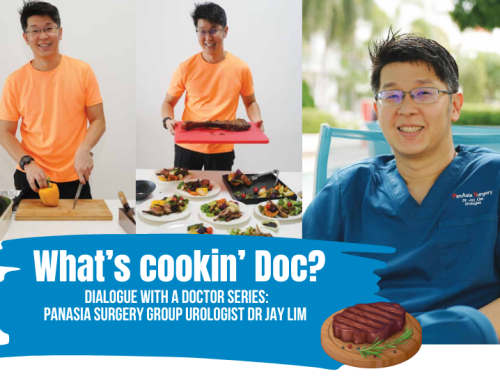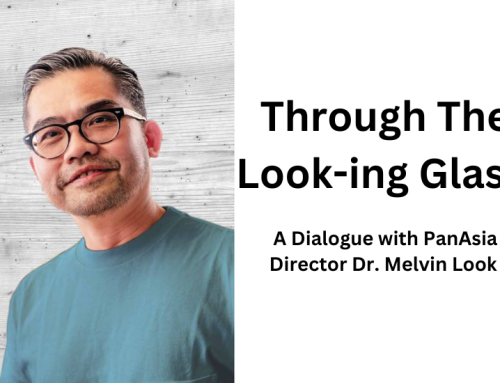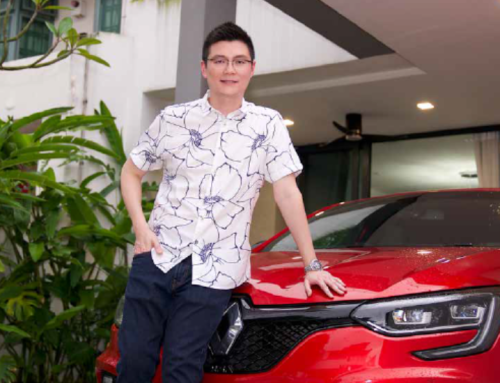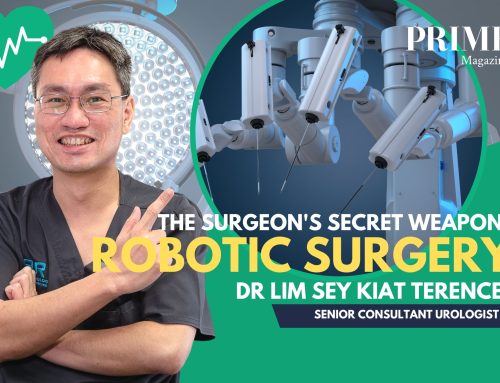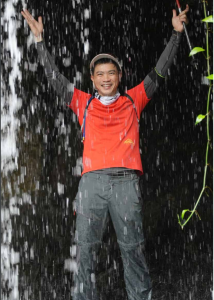
In the realm of life’s arduous journeys, few paths are as demanding as the career path undertaken by doctors. It is akin to scaling the peaks of a formidable mountain. The ascent can be fraught with obstacles, each step requiring unwavering determination, unyielding perseverance and an unrelenting passion for the summit. One must be driven by an unquenchable thirst for knowledge and a burning desire to heal in order to reach the pinnacle.
For this issue’s Prime Interview, we have the pleasure of speaking with PanAsia Surgery Group’s Vascular and Endovascular Surgeon Dr John Wang Chaw Chian. An avid mountain climber, Dr Wang had found himself at the base of life’s colossal mountain at one point in his life, surrounded by the rugged terrain of adversity. He tells us about how he overcame this steep challenge, as well as his views on health and wellness, his core beliefs and his passions, including mountain climbing.
Good morning, Dr Wang. It is a lovely morning to spend time outdoors. We greatly appreciate the opportunity to interview you in this setting. First off, tell us more about your career. Tell us why you chose to specialise in vascular/endovascular surgery?
Dr John Wang: Good morning to you as well. I love the outdoors and thought it is a good idea to meet outside. Anyway, with regards to your question, it started like this: during my surgical training in the US, between 2001-2007, I was exposed to the exponential advancements that vascular surgery, in particular endovascular surgery, was undergoing at that time. It was so exciting to see these new developments in treating vascular diseases. As more vascular surgeons acquired this new skillset to the benefit of patients, I decided to change track – from a cardiothoracic surgeon to a vascular surgeon. I could see that mentors and trainees alike were at the forefront of this new paradigm shift. They were pushing boundaries beyond the unknown and conducting clinical trials to answer new questions. It was pioneering work and, in many aspects, continues to be.
Vascular surgery is a relatively young surgical specialty (about 70 years in the US). The nature of vascular surgery is that it can be acute, demanding in skills, and unforgiving if mistaken clinically or therapeutically. To be honest, it kind of suits my character. I know myself well. I am someone who enjoys instant gratification, but am ready to acknowledge mistakes. I am not one to dwell, and am quick to implement restitution. And I never fear hard work.
How do you stay motivated and passionate about your work, especially during challenging/emotionally taxing situations?
JW: That is simple: my patients keep me going. Seeing them do well motivates me to do my best and fuels my passion for my craft. Of course, not all patients do well and when this happens, I have the benefit of my robust surgical training and work experience to be able to be professional in what I do, and yet remain compassionate to my patients and their family to help them weather through the rough patches.
How do you keep yourself at the forefront of your field?
JW: My interest and passion drives me towards continuous learning. I really like what I do, operating on blood vessels, and I am always curious about up and coming new techniques, therapies and developments. I am also always pursuing the truth about the long- and longer-term outcomes of established therapy. Are they truly beneficial? To be honest, I used to loath continuous learning. Now, I think it is crucial to stay up to date in order to best serve the patients whom I am entrusted with. It will be a disservice to them if I do not.
What professional achievements are you most proud of, and why?
JW: For me, the fact that I am where I am right now – a vascular surgeon – is an achievement by itself. I battled against the odds to graduate from medical school. This is not for lack of interest, determination or ability. I faced a severe lack of funding to see through the entire course, even getting half of it presented a real challenge. Yet, miraculously, I made it! I am thankful for this every day. Wow.
Tell us more about how you got through this ordeal and what it taught you.
JW: In my darkest hour in medical school, with a straight A’s transcript in one hand and a tuition fee invoice stamped “Overdue” in the other, I had so many reasons to be angry and frustrated about the deluge of unjust that the world dumped on me. I learned the hard way that being indignant and feeling entitled would not help my situation one bit, so I fought on. Then, despite all the odds stacked against me, I secured a federal scholarship and graduated on time.
I think the great theologian Reinhold Neihbur (1892-1971) epitomised it perfectly in his Serenity Prayer, “God grant me the serenity; To accept the things I cannot change. Courage to change the things I can; And the wisdom to know the difference.” This is exactly what I learnt from that experience.
What other experiences have had a significant impact on your career?
JW: There have been so many, and it would not do justice to just tell one story and not tell another. But what I can tell you is that it really is true that the patients are a doctor’s best teachers. Most patients do well (thankfully), and those are the good days. Smiles all around and that is what is expected, right? But sometimes, patients do poorly and I wonder if they could have had a different outcome if another pair of hands had come in to operate on them. I contemplate if I had failed these patients in some way. Those are the bad days.
To sum up the lesson: never take good days for granted. Be prepared, every time.
Are there any developments or opportunities in the industry that excite you?
JW: One of the unique things about vascular surgery is that we operate on all parts of the body with two exceptions: the brain and the heart. We have neurosurgeons and cardiothoracic surgeons for those. All the blood vessels – arteries and veins – in the rest of the body are within the domain of the vascular surgeon, and they include those in the neck, chest, abdomen, pelvis, upper and lower extremities.
At every anatomical area, there are new vascular therapies being developed and evaluated. They are mostly of endovascular nature, which is minimally invasive. The advancements are rapid and the biomedical devices being developed are smaller, slicker and more sophisticated. This translates to safer and more effective treatment which can be offered to more patients, including older and sicker patients who would otherwise be disqualified for traditional open vascular surgery.
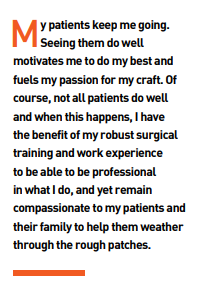
Let us circle back to one of the core themes in our Prime Interview series: general health and wellness. What do these terms mean to you?
JW: I define “health” as an organic state of being free of disease, illness or injury. “Wellness”, on the other hand, is more of an emotion or feeling of positivity, such as comfort, contentment and happiness, irrespective of the health status of the individual.
Let me better illustrate my point. A diabetic patient may not be healthy, but feels well because his/her disease is under control. He/she feels good and happy because he/she is without any pain or discomfort, and is not experiencing any complications that come with diabetes.
Being a doctor for 26 years has taught me that we take care of patients and not diseases per se. A lot of vascular conditions are chronic diseases that cannot be cured but can be managed. Our goals are primarily to preserve life and limb foremost; beyond that, we strive to maintain functionality, while improving our patients’ quality of life and wellness.
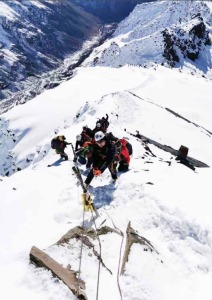
How should one look after his/her own health and wellness?
JW: Three things: best to stick to the basics, be honest with yourself, and realise that good things usually need work.
Our body does not really need much, but it does require the essentials. So, eat healthily and consume nutritious food in correct portions. Taking three full meals a day in this day and age is probably a caloric overload for most adults. Growing kids who run around all day need three meals a day. You and I, who do civilised work between 9-5 everyday, probably do not.
Besides this, I will say that enjoyable junk food should not be disallowed; just remember that you are what you eat. If a certain type of unhealthy food is your sinful indulgence, enjoy it by all means. Make yourself happy and allow your psyche to be contented. But moderate how much you consume because you need to work off what you put into your body.
Take the example of a curry puff (200g-250g), which has about 250 calories. It will take around 1.5 hours of walking (3.2km/ hr) or about 30 minutes of jogging (8km/hr) to burn that off. Or else, the excess energy will contribute to weight gain, obesity and all the metabolic problems that may come with it, like diabetes. So, the more you consume, the more exercise you will have to do to stay healthy. This will need a certain amount of discipline and this is where being honest with yourself is important. A typical cheeseburger and medium french fries have about 300 calories and 380 calories respectively. When was the last time you ran or exercised to burn that off?
I mentioned psyche earlier, and this is important for mental health and wellbeing. We all have our own needs and wants, and it is important to know and acknowledge them. Our psyche is primal and there are emotions that we feel. These are not necessarily something we can always control.
So, it is important to know how to deal with these emotions: to give in or deny with reasoning. Ultimately, if we are forced to do something involuntarily, it will lead to unhappiness. We navigate and deal with people, situations and problems on a daily basis in life and in work. Some aspects of which can be sources of stress, anxiety, unhappiness or even depression. Having a positive attitude when dealing with these is always helpful, as is the ability to detach from the situation and look at the bigger picture. Most things do not really matter when you realise that life is short; and life is definitely too short to worry about petty things.
I also think it is very important to have hobbies. Something which you will happily indulge in doing and never consider to be a chore. A lot of people feel guilty about having a hobby. But in the face of constant demands in life and work, they are necessary. Do not feel bad about indulging in hobbies. Keeping a hobby (or two) nurtures the psyche such that we are better able to handle our life and/or work situations. For me, the problem is that I have too many hobbies…haha…
How do you manage your own work-life balance, considering the demanding nature of your job?
JW: For me, being a surgeon is a lifestyle choice and surgery is what I do. I concede that as a surgeon, not all of my time belongs to me. If I am called to a patient, I will have to tend to the patient. This means time away from my family and less personal time. And this can happen at any time, any day – weekends and public holidays inclusive.
However, it does not always feel like work to me because this is what I spent many years training and practising to be good at. It is a source of motivation and satisfaction knowing that I have the skills to alleviate another person’s pain and suffering, or to be able to salvage a limb or life. So, my approach is: work hard when I have to; roll back, relax and spend time with family when I do not have to. I make it a point not to bring work home unless absolutely necessary and I proactively take time off.
This sounds easy when I say it like this, but in reality, it can be challenging. Work is usually difficult, high-risk and can be all consuming. It can be even harder on the family with absenteeism eroding into important family time. Think missed birthdays, anniversaries, etc. So, having a supportive and understanding spouse and family is key to what I do.
What does a typical day for you look like?
JW: I will be up at 0530hrs and out of the house by 0630hrs on run days. This is about three times a week – 8km run each time. Non-run days consist of doing core exercises for 20-30 minutes. After exercise, it is brewed drip coffee from 0800- 0830hrs, and I am in the clinic by 0900hrs.
My 5½ work-day week comprises clinic patient consultations and scheduled surgeries. Lunch is optional or can be a cup of coffee. I am usually home by 1800-1830hrs, or whenever my work is done. Some long surgery days can go past midnight. Weekends are for respite, errands, or meeting up with family and friends.
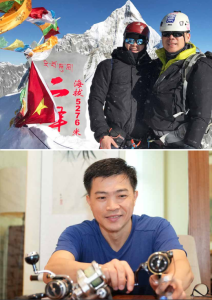
You talked about the importance of having hobbies. What is your jam?
JW: I have always loved the outdoors and continue to do so. When I was little, I was the most tanned among my siblings and they jocularly proclaimed that I was the adopted child in the family. We laugh about it now, but it was not very funny to a 5-year-old.
I was a scout, and I loved camping, hiking and mountain climbing. I would make a trip every school term break. But all that went into hiatus during medical school and surgical training. I also like fast motorbikes and cars – they kept me sane.
Fast forward three decades, and I came back to Singapore in 2014. Nowadays, I still do hiking/mountain climbing, while I have also taken up deep-sea fishing. Technically, I am still a novice when it comes to mountain climbing. I did my first 5,000m technical climb at Mount Siguniang (2nd peak) in Szechuan, China pre-pandemic. My most memorable climb in the region was Mount Rinjani, Indonesia, and my next climb will be Annapurna Base Camp (Nepal) in October 2023.
One of my climbing buddies introduced deep-sea fishing to me in 2018, and we go to Tioman Island and the South China Sea a few times a year. The thrill of fighting a big fish hooked at the end of a 200-foot line is indescribable. The sheer power of some of these fish and the anticipation of discovering the fish that is giving you such a strenuous physical workout is exhilarating. Sometimes, the fish wins and gets away, but hopefully we get to land the fish and enjoy it for dinner.
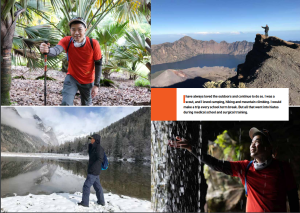
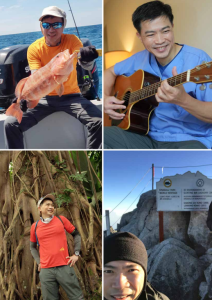
What benefits and lessons have you derived from your hobbies?
JW: There are enormous health benefits from climbing and fishing as they are quite physical, and require a certain amount of fitness. They incentivise me to maintain my exercise routine, especially on “lazy” days when it is easier to stay asleep under the duvet or when it is drizzling outside. I run regularly – rain or shine – to keep in shape and stay healthy. This helps me to keep fit for my hobbies – which I enjoy immensely. There is also the added bonus of being able to withstand some of my long surgeries better, as some can be 6-8 hours long.
Actually, in terms of lessons, the converse is true. Most of my patients are elderly, have multiple medical problems and suffer from a certain amount of disability. I am reminded that all of us have the potential to become like that as we age. Hence, while still healthy and able, it is prudent to take the time and opportunity to do meaningful and enjoyable things in life. Wait no more, work hard and play harder!
“Wait no more, work hard and play harder” sounds absolutely right. What other core life principles do you adhere to?
JW: Be truthful to yourself, above all, and be true to others. Life is short, so do not waste time, be it yours and anyone else’s. Say what you mean and mean what you say. Be kind to everyone and do not ignore the opportunity to tell someone you love them. And there is always my favourite Yoda quote, “Do, or do not, there is no try!”
Do you do any volunteer work?
JW: I am embarrassed to say that I do not engage in much volunteerism due to my time constraints. However, I have had very good mentors who trained and guided me in my career (and life), and whom I have the utmost respect for and am forever indebted to. We still Zoom meet for chats once every month or two. There are three of them, all in their 70s and 80s, who have since retired, and are living in various places in the US.
To pay it forward, I have mentored residents and fellows in training, and I continue to mentor high school graduates who are looking to get into medical school. It is heartening to see these young, talented individuals, so full of energy and grit, follow their passion and succeed at what they set out to do. Ultimately, this may be self-serving as they remind me of a younger version of myself!
So, what advice would you give to an aspiring doctor/medical professional who is just starting his/her professional journey?
JW: Do it for interest and passion. If pursued for status, fame or fortune, you will be gravely disappointed and unhappy.
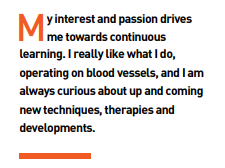
We are in the last leg of our interview here, where we ask about some general observations/advice. Now, in your line of work, what aspects of health do you often see people neglect or are not aware of?
JW: Exercise and stress management. Here in Singapore, a lot of folks dismiss the importance of regular exercise due to a few misperceptions. The older generation deem it as hard work and after a life of hardship, the last thing they want to do is break out a sweat if they do not have to. On the other hand, younger folks are deathly afraid of the sun and outdoors because it is hot, and one can get tanned very easily. Fair skin is so desirable and pervasive that they try to avoid exercising altogether!
Singaporeans are a very stressed people, and this can be seen across the board: from primary school kids having to do well in school, to working adults trying to establish a career while navigating the high cost of living, to elderly folks who worry about the healthcare cost burden they will incur. While these are very real and legitimate concerns, a lot of them allow themselves to be immersed in these stressful conditions without doing anything to address them. I suppose it may be easier to just keep going, continue the long hours without complaint or recourse, and wonder why ailments start to develop. But it is no real mystery. Hypertension, coronary artery disease, heart attacks, gastritis, eczema, allergies and autoimmune disease have all been linked to mental stress.
What is the worst thing in our modern lifestyle that you believe is ailing people?
JW: The abundance of processed food/food products and the perpetuation of a sedentary lifestyle. The way we produce our food makes processed food very affordable and readily available. Processed food is not necessarily healthy (high in sugars, salts and fats), but because they are cheaper, they make their way preferentially onto our supermarket shelves and restaurants. This convenience contributes to the sedentary lifestyle observed in most developed nations, with its rising rates of obesity and metabolic diseases.
Parting advice for Prime readers?
JW: Life is short so do not sweat the small stuff. Work hard, play harder, do meaningful things, and strive to be happy. Stay healthy, and that usually means some work is involved.








